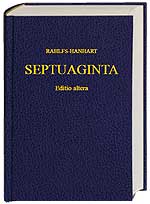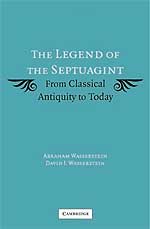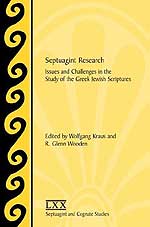I have made a few updates to my Annotated Guide to the LXX. Among the updates, you may find the full listing of all the critical editions of the Septuagint useful. It includes all of the Göttingen Septuagint volumes as well as the “Larger Cambridge Septuagint” volumes.
Category Archives: Septuagint
Septuagint Institute Website
The Septuagint Institute at Trinity Western University and ACTS Seminary has a new website. It has information about the Institute as well as announcements about upcoming events. Check it out.
Revised Septuaginta Soon to be Published
Wieland Willker on the Text Criticism list has alerted us to a revised edition of Septuagina to be published later this summer by the German Bible Society. The revision was done by Robert Hanhart and includes over a thousand minor corrrections and supplements to Rahlfs’ edition.
 Here is the information from the German Bible Society:
Here is the information from the German Bible Society:
Septuaginta (Das Alte Testament Griechisch)
Edited by
Editio altera (= 2., durchgesehene und verbesserte Auflage),
Edited by
12 x 18.4 cm
LXXIV + 2127 pages
ISBN 3438051192
€ 46.00
In an article published by Robert Hanhart last year (“Rechenschaftsbericht zur editio altera der Handausgabe der Septuaginta von Alfred Rahlfs” Vetus Testamentum 55 [2005] 450-60), it was made clear that this would only be a minor revision that will leave Rahlfs’ base text substantially intact.
This new “Rahlfs-Hanhart” edition will be out in July 2006.
Another New LXX Book: The Legend of the Septuagint
 There is a new book on the Septuagint that focuses on the legends surrounding its origins (the Letter of Aristeas), as well as its reception history:
There is a new book on the Septuagint that focuses on the legends surrounding its origins (the Letter of Aristeas), as well as its reception history:
The Legend of the Septuagint: From Classical Antiquity to Today, (Cambridge: Cambridge University Press, 2006; Buy from Amazon.ca | Buy from Amazon.com).
Here is the blurb from the Cambridge site:
The Septuagint is the most influential of the Greek versions of the Torah. The exact circumstances of its creation are uncertain, but different versions of a legend about the translation have existed since antiquity. Begun with the Letter of Aristeas, the legend describes how Ptolemy Philadelphus (285 247 BCE) commissioned 72 Jewish scribes to translate the sacred Hebrew scriptures for his library in Alexandria. The Letter and subsequent variations on the story recount how the scribes, working independently, produced word-for-word, identical Greek versions. The story has been adapted and changed for many reasons: to tell a story, to explain historical events, and – most frequently – to lend authority to the Greek text for the institutions that used it. This book offers the first account of all of these versions over the last two millennia, providing a history of the uses and abuses of the legend in various cultures around the Mediterranean.
Here is the table of contents for the volume. As you can see, it covers an impressive amount of material.
- The Letter of Aristeas
- The Hellenistic Jewish tradition
- The Rabbis and the Greek Bible
- The Ptolemaic changes
- The church fathers and the translation of the Septuagint
- Among the Christians in the Orient
- The Muslims and the Septuagint
- Yosippon and the story of the seventy
- Karaites, Samaritans and Rabbanite Jews in the Middle Ages
- The Septuagint in the Renaissance and the modern world
It looks quite interesting; I just may have to order it. (via the b-greek list).
New Septuagint Volume
 When I was in Toronto for CSBS, I went to the annual Pietersma picnic and caught up with the likes of Claude Cox, Tony Michael, Cameron Boyd-Taylor, Paul McLean, Wade White, and, of course, Al Pietersma. We talked briefly about a recent volume on the Septuagint in which Pietersma, Boyd-Taylor, and White contributed:
When I was in Toronto for CSBS, I went to the annual Pietersma picnic and caught up with the likes of Claude Cox, Tony Michael, Cameron Boyd-Taylor, Paul McLean, Wade White, and, of course, Al Pietersma. We talked briefly about a recent volume on the Septuagint in which Pietersma, Boyd-Taylor, and White contributed:
Septuagint Research: Issues And Challenges in the Study of the Greek Jewish Scriptures, , eds. (Septuagint and Cognate Studies Series 53; Atlanta: Society of Biblical Literature, 2006; Buy from Amazon.ca | Buy from Amazon.com).
Here is the table of contents for the volume. As you can see, it covers a fair range of topics.
Prolegomena
- “Concerning the LXX as Translation and/or Interpretation Contemporary ‘Septuagint’ Research: Issues and Challenges in the Study of the Greek Jewish Scriptures” by Wolfgang Kraus and R. Glenn Wooden
- “In a Mirror, Dimly- Reading the Septuagint as a Document of Its Times” by Cameron Boyd-Taylor
- “Exegesis in the Septuagint: Possibilities and Limits (The Psalter as a Case in Point)” by Albert Pietersma
- “Translation as Scripture: The Septuagint in Aristeas and Philo” by Benjamin G. Wright III
- “Contemporary Translations of the Septuagint: Problems and Perspectives ” by Wolfgang Kraus
Issues Concerning Individual LXX Books
- “The Hermeneutics of Translation in the Septuagint of Genesis” by Robert J. V. Hiebert
- “Reconstructing the OG of Joshua” by Kristin de Troyer
- “Interlinearity in 2 Esdras: A Test Case” by R. Glenn Wooden
- “A Devil in the Making: Isomorphism and Exegesis in OG Job 1:8b” by Wade Albert White
- “The Jewish and the Christian Greek Versions of Amos” by Aaron Schart
- “LXX/OG Zechariah 1-6 and the Portrayal of Joshua Centuries after the Restoration of the Temple” by Patricia Ahearne-Kroll
Comprehensive Issues and Problems Concerning Several LXX Books
- “Messianism in the Septuagint” by Heinz-Josef Fabry
- “Idol Worship in Bel and the Dragon and Other Jewish Literature from the Second Temple Period” by Claudia Bergmann
- “From ‘Old Greek’ to the Recensions: Who and What Caused the Change of the Hebrew Reference Text of the Septuagint?” by Siegfried Kreuzer
- “Towards a Theology of the Septuagint” by Martin Roesel
Reception History of the LXX in Early Judaism and Christianity
- “The Letters of Paul as Witnesses to and for the Septuagint Text” by Florian Wilk
- “Flourishing Bones — The Minor Prophets in the New Testament” by Helmut Utzschneider
- “Abandonment and Suffering” by Stephen Ahearne-Kroll
- “The Septuagint Textual Tradition in 1 Peter” by Karen H. Jobes
- “The Epistle to the Hebrews and the Septuagint” by Martin Karrer
- “Observations on the Wirkungsgeschichte of the Septuagint Psalms in Ancient Judaism and Early Christianity” by Ralph Brucker
- “Textual Variants as a Result of Enculturation: The Banishment of the Demon in Tobit” by Beate Ego
UPDATE: I just noticed the Evangelical Text Criticism blog has a notice of this work as well (without the table of contents, but with a blurb).
